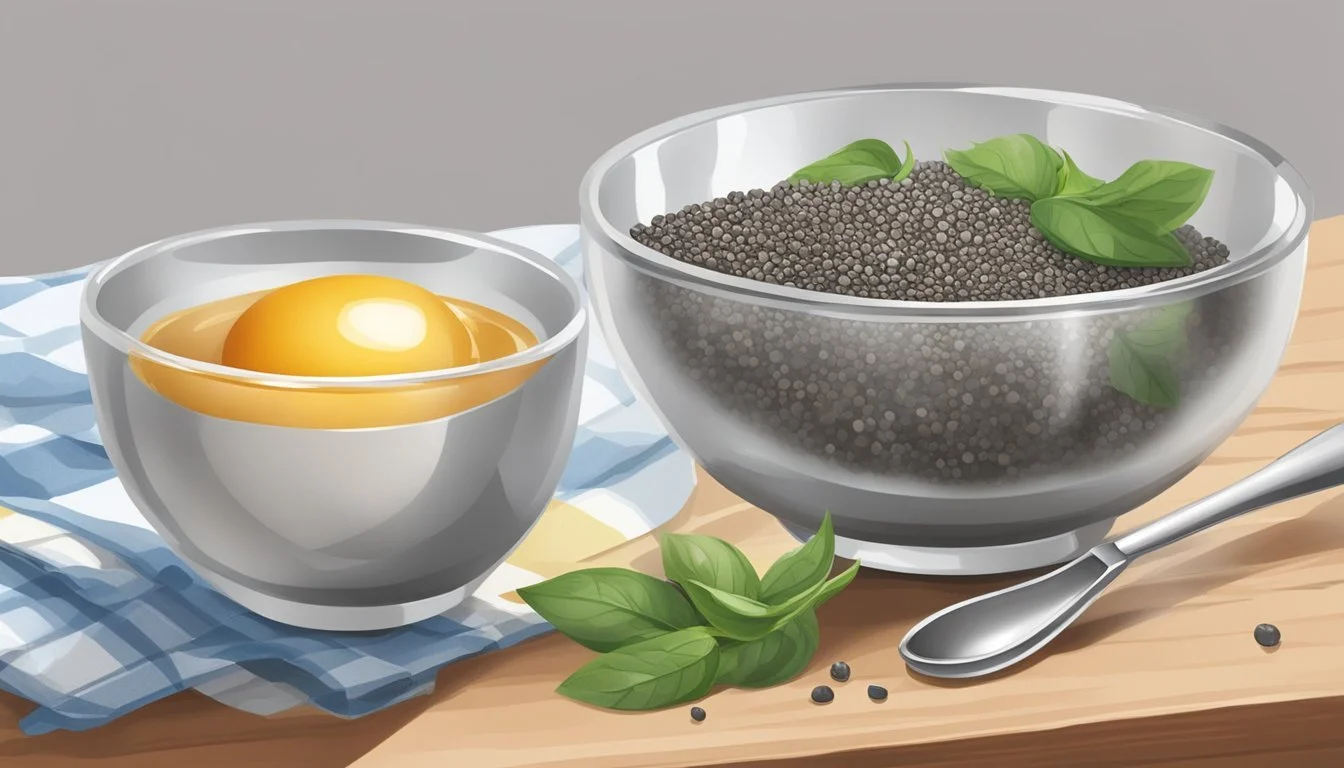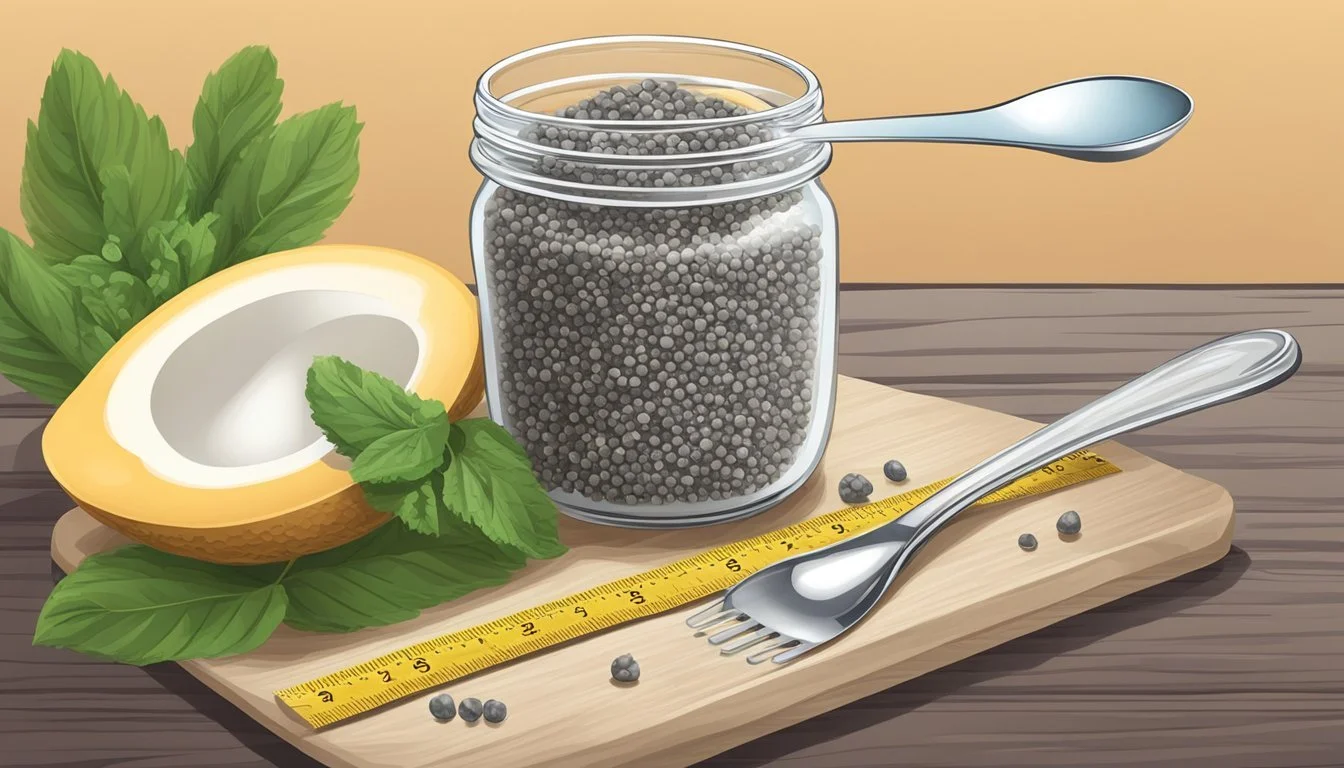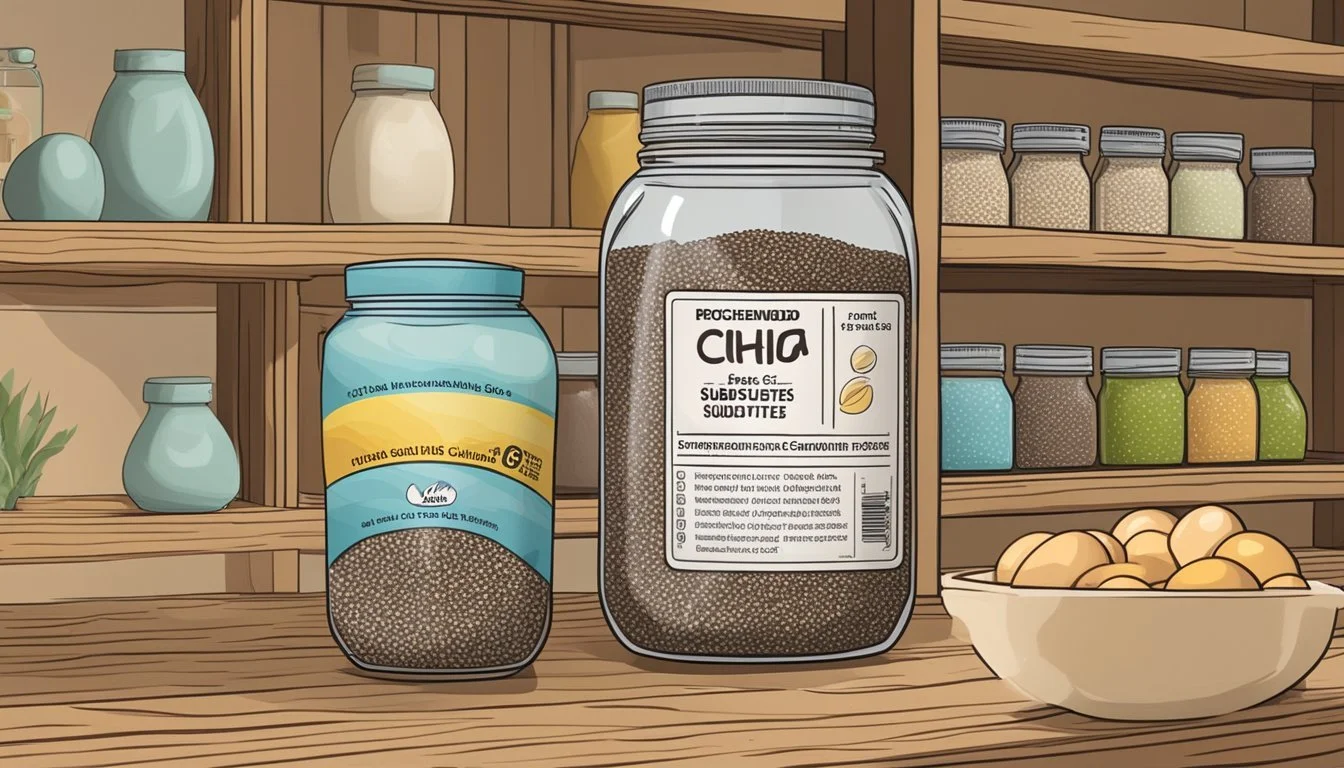Chia Egg Substitutes
Baking Without Eggs Made Simple
Chia seeds have gained remarkable popularity for their versatility and nutritional benefits, especially among those following a vegan lifestyle or those with egg allergies. These tiny, unassuming seeds are extracted from the Salvia hispanica plant and are lauded for their health benefits, including a rich content of omega-3 fatty acids, antioxidants, and fiber. Their unique ability to absorb several times their weight in water contributes to the creation of a gelatinous texture akin to that of an egg, making them an ideal binder in various recipes.
As an egg substitute, the chia egg provides a plant-based alternative that seamlessly integrates into baking and cooking processes. When mixed with water, chia seeds swell and form a cohesive mixture that can effectively bind ingredients together, similar to the role of eggs in traditional recipes. Given the growing interest in plant-based eating, the use of chia seeds as an egg substitute offers a nutritionally beneficial and simple adaptation for those who either choose or need to avoid animal products.
While chia eggs are not identical to chicken eggs in terms of taste and texture, their neutral flavor and binding properties are sufficiently versatile for a wide array of recipes. From sweet baked goods to savory dishes, chia seeds provide an accessible and healthy way to maintain the integrity of favorite recipes without the use of conventional eggs, catering to the diet preferences and nutritional needs of diverse populations.
Understanding Chia Seeds
Chia seeds are a powerhouse of nutrients and have versatile applications in cooking, especially as an egg substitute for vegan diets.
Nutritional Profile
Chia seeds boast an impressive nutritional composition, making them a valuable addition to any diet. They are rich in dietary fiber, helping to promote digestive health. A high content of protein in chia seeds provides essential amino acids, while omega-3 fatty acids are abundant, contributing to cardiovascular health. They're also a good source of calcium and iron, minerals crucial for bone health and oxygen transportation in the blood, respectively. Furthermore, chia seeds contain significant levels of antioxidants, which combat oxidative stress in the body. Here's a brief overview of their nutritional value per ounce (approximately 2 tablespoons):
Nutrient Amount Dietary Fiber 10.6g Protein 4.4g Omega-3 Fatty Acids 4915mg Calcium 177mg Iron 2.2mg Antioxidants High levels
Culinary Uses
In the culinary world, chia seeds are prized for their ability to form a gel-like substance when mixed with water. This property is particularly useful in vegan baking, where they act as a binding agent, much like an egg would in traditional recipes. For egg substitution, chia seeds are typically ground and then mixed with water to thicken the mixture. They can integrate seamlessly into smoothies, puddings, and baked goods, providing a nutritional boost without altering the flavor profile of the dish.
The Basics of Chia Egg Substitute
Chia eggs serve as an exceptional plant-based binder with a texture akin to traditional eggs, essential in vegan baking.
Preparing Chia Egg
To prepare a chia egg, one needs to combine 1 tablespoon of ground chia seeds with 3 tablespoons of water. This mixture should then be left to sit for a few minutes. During this time, the chia seeds absorb the water and expand, resulting in a thick, gel-like consistency that mirrors the binding properties of a chicken egg.
Chia Egg in Vegan Baking
In vegan baking, chia eggs are a popular egg substitute due to their neutral flavor and robust binding capabilities. They are most effective in recipes where an egg's primary function is as a binder, such as in muffins, breads, and certain cookies. The gel-like substance that forms when chia seeds are mixed with water helps to coalesce the other ingredients, contributing to the desired structural integrity and moisture retention in the final baked product.
Chia Egg's Role in Recipes
Chia egg substitutes play a pivotal role in baking, offering a plant-based alternative for eggs that maintains the integrity of various recipes such as cakes, cookies, and muffins, while also contributing health benefits.
Binding Properties
Chia eggs act as a binder in recipes, which is essential for holding ingredients together. When mixed with water, chia seeds form a gel-like substance that mimics the binding function of eggs. For every egg to be replaced, 1 tablespoon of ground chia seeds mixed with 3 tablespoons of water works effectively. This is particularly useful for cakes, cookies, and also for forming patties in dishes like burgers.
Baking: Provides cohesion in batter and dough
Pancakes: Ensures ingredients stick together giving proper shape
Health Benefits
Using chia seeds as an egg substitute introduces health benefits to recipes. They are a rich source of fiber, omega-3 fatty acids, and contain protein, all contributing to a nutritious profile.
Fiber: Enhances digestive health
Omega-3: Supports heart health
Texture and Consistency
Chia seeds impact the texture and consistency of baked goods. They create a moister end product, and while they help bind, they do not promote the same level of rise or fluffiness as eggs, which may affect the outcome in cakes. Therefore, they are more suitable for recipes where a dense, moist texture is desired, such as in muffins or dense cookies.
Cakes: May result in a denser texture, not ideal for light, spongy varieties
Cookies/Muffins: Contributes to a moist, chewy texture
By understanding the role of chia eggs in recipes, bakers can better manage the texture, nutritional content, and binding qualities of their baked goods.
Comparing Egg Substitutes
In the world of vegan baking, egg substitutes play a pivotal role in replicating the binding properties of eggs. Two widely used substitutes are chia and flax seeds, both of which form gel-like consistencies when mixed with water. This section examines how chia eggs compare to flax eggs and other vegan substitutes in terms of their application and effectiveness in baking.
Chia vs. Flax Egg
Chia seeds and flax seeds both gel when combined with water, making them excellent binders. Here's a quick comparison:
Ratio: A standard chia egg is made with 1 tablespoon of ground chia seeds and 3 tablespoons of water. Conversely, a flax egg requires 1 tablespoon of ground flax seeds (flaxseed meal) with 2 ½ tablespoons of water.
Texture: Chia seeds tend to form a more viscous gel compared to flax seeds, which can create a slightly smoother texture.
Nutritional content: Both seeds are rich in omega-3 fatty acids and fiber but possess distinct nutritional profiles. Chia seeds contain slightly more calcium, while flax seeds have a higher concentration of lignans, which may have antioxidant properties.
Chia vs. Other Vegan Substitutes
Other popular vegan substitutes include tofu and aquafaba. Here's how chia compares:
Aquafaba: This is the liquid from cooked chickpeas. It's especially effective for recipes requiring egg whites, such as meringues. Chia cannot replicate this property.
Substitute Best Used For Preparation Chia Seeds Baking, Binding Gel formed with water Aquafaba Meringues, Foams Whipped to achieve desired texture
Tofu: Silken tofu can replace eggs in recipes where density and creaminess are desired, such as in custards or pies. Chia eggs are generally preferable for applications where a more neutral flavor and lighter texture are needed.
In vegan baking, the choice of an egg substitute depends on the desired texture and flavor, as well as the specific role of the egg in the recipe. Chia and flax eggs are best for binding, while aquafaba and tofu serve unique roles that chia may not fulfill.
Integrating Chia Egg into Various Diets
Chia eggs are a versatile ingredient that cater to a range of dietary preferences and requirements, from plant-based diets to allergen-free cooking.
Chia Egg for Specific Dietary Needs
Vegan: For individuals following a vegan diet, chia eggs provide a crucial binding component for baked goods and other recipes that traditionally call for eggs. Composed of just water and chia seeds, they're a plant-based alternative offering essential nutrients such as omega-3 fatty acids and fiber.
Allergy-Conscious: Those with egg allergies find chia eggs a safe and inclusive option. They allow for easy recipe adaptations with minimal impact on texture and taste. Importantly, chia seeds are naturally egg-free and gluten-free, posing no risk for common allergens.
Gluten-Free: As chia seeds do not contain gluten, their use as an egg substitute aligns perfectly with gluten-free diets. When making recipes that require binding without gluten, a chia egg steps in effectively, without compromise to digestive health.
Heart Health: Chia seeds are high in fiber and omega-3 fatty acids, which are beneficial for heart health. By including chia eggs in one's diet, an individual may contribute positively to their cardiovascular well-being.
Digestion: Due to their gel-forming ability and high fiber content, chia seeds can aid in digestion. When used as an egg replacement, they can help to promote better bowel movement and digestive regularity.
Culinary Tips and Tricks
Using a chia egg as an egg replacement in cooking and baking can be a simple and effective way to veganize recipes. It’s important to understand how to adapt traditional recipes and master the techniques that ensure the best outcome.
Recipe Adaptations
When substituting a chia egg in recipes, one must consider the functions that a traditional egg serves - binding, leavening, and moisturizing. A chia egg excellently fulfills the binding role, so it's often used in baking to hold ingredients together. For one standard egg, mix 1 tablespoon of chia seeds with 3 tablespoons of water and let it sit for about 5 minutes until it becomes gelatinous.
Typical Prep Time: 5-10 minutes
Total Time: Depends on the recipe
Cook Time: Unchanged from the original recipe
In recipes where eggs are the primary leavening agent, additional leavening may be required. This could include increasing the amount of baking powder or baking soda.
Cooking Techniques
While integrating a chia egg into a recipe, it's crucial to thoroughly mix the chia seeds with water before incorporating them into the other ingredients. The seeds need time to swell and develop a slimy, egg-like texture that will add the desired consistency to the dish.
Ensure even distribution by whisking the chia egg into the batter or dough.
For a smoother texture in cakes or cookies, grind the chia seeds before soaking them in water.
The chia egg mixture should be viscous and thick; if it's too runny, add a bit more chia seeds and wait a few more minutes.
By following these guidelines, cooks can effectively use chia seeds to replace eggs in various recipes, maintaining the dish's integrity while catering to dietary preferences.
Added Nutritional Information
Chia seeds offer more than just a substitute for eggs; they contribute a range of nutritional benefits that are valuable in any diet. The following subsections provide in-depth insight into the macro and micro nutrients present in chia seeds, as well as the dietary considerations they address.
Macro and Micro Nutrients
Chia seeds are nutritionally dense and possess a variety of essential nutrients. A one-tablespoon serving of chia seeds, approximately equivalent to one chia egg, contains:
Calories: about 60
Fat: 4 grams, with a balance of omega-3 and omega-6 fatty acids
Carbohydrates: 5 grams
Dietary Fiber: 4 grams
Protein: 2 grams
Sodium: negligible amounts
Potassium: 44.8 milligrams
Additionally, chia seeds are a good source of antioxidants, calcium, phosphorus, magnesium, and iron. These micro nutrients contribute to overall health, supporting bone health, antioxidant function, and various other bodily processes.
Dietary Considerations
For individuals with specific dietary needs, chia seeds are an accommodating ingredient. They are inherently:
Gluten-Free: suitable for those with gluten intolerance or celiac disease.
Vegan: a plant-based source of nutrition that successfully replaces eggs in recipes.
Low in Sodium: making them a good option for heart-healthy diets.
In terms of health considerations, the high fiber content in chia seeds supports digestive health, while the presence of omega-3 fatty acids is beneficial for heart health. However, because chia seeds are calorie-dense, portion control is advised for those monitoring their caloric intake.
Creative Uses of Chia Egg Substitute
Replacing traditional eggs with chia eggs can impart a subtle nutty flavor and offer a nutritional boost to various dishes. The gelatinous texture of chia eggs, created by combining chia seeds with water, acts as an excellent binder in recipes.
Desserts and Baked Goods
Cakes: Chia eggs ensure that cakes retain their moisture and structural integrity.
Cookies: They help cookies achieve a chewy texture without altering taste significantly.
Muffins: Using chia eggs in muffins adds to the dietary fiber content while preserving the fluffiness.
Example: Chia Chocolate Cake
Preheat oven to 350°F (176°C).
Prepare chia eggs by mixing 2 tablespoons of chia seeds with 6 tablespoons of water; let sit for 5 minutes.
Incorporate chia eggs into the cake batter as you would with regular eggs.
Main Courses
Burgers: Chia eggs can be used to bind together vegetable burger patties.
Meatballs/Meatloaf: They provide moisture and help maintain the shape without adding any animal product.
Methods:
Burgers: Combine 1 tablespoon of chia seeds with 3 tablespoons of water per egg required. Mix with other patty ingredients.
Meatballs/Meatloaf: Prepare chia egg mixture and integrate uniformly with the other ingredients before shaping.
Breakfast Options
Pancakes: Chia eggs offer a vegan alternative that keeps pancakes light and fluffy.
Vegan French Toast: Create a batter with chia eggs to dip bread in, producing a crispy outside and custard-like interior without dairy.
Quiche: Chia eggs act as a binding agent in vegan quiches, ensuring the dish is cohesive and sliceable.
Preparation:
Pancakes: Mix 1 tablespoon of ground chia seeds with 3 tablespoons of water per egg; add to batter.
Vegan French Toast: Soak bread in a mixture containing chia eggs to absorb the liquid before pan-frying.
Quiche: Blend chia eggs into the filling for a stable, egg-free quiche.
Storage and Shelf Life
When it comes to utilizing chia seeds as an egg substitute, a thorough understanding of their storage and shelf life ensures both the effectiveness and safety of their use in baking.
Pantry Management
In the pantry, chia seeds exhibit a remarkable shelf life due to their inherent stability. When kept in a cool, dry place away from direct sunlight, chia seeds can remain usable for approximately two to four years. It's imperative to store them in a tightly sealed container to prevent moisture from compromising their quality. For users seeking an egg substitute for baking, chia seeds are reliable as their prolonged shelf life provides an enduring binding agent for various recipes.
Estimate of Shelf Life in Pantry Conditions: 2-4 years
Freezing and Thawing
Chia seeds can also be stored in the freezer to extend their shelf life beyond the pantry estimate. By placing them in an airtight, freezer-safe container or bag, individuals may preserve the seeds' quality for an extended period. Upon removal from the freezer, chia seeds do not require thawing and can be used directly in the preparation of the egg substitute mixture. This instantaneous usability makes chia seeds an even more convenient option for those in need of a shelf-stable binding component.
Freezer Storage Practice: Airtight, freezer-safe container or bag
Direct Use Post-Freezing: No thawing necessary
Troubleshooting Chia Egg Substitutes
Chia egg substitutes are a staple in vegan baking, acting as a binding agent without the leavening properties of eggs. This section provides solutions for common issues with chia eggs and adjustments to baking recipes to ensure success.
Common Issues
When using a chia egg substitute in baking, users may encounter a few common issues:
Inconsistent Texture: If a chia egg turns out too runny or too thick, it may not bind effectively. This can often be rectified by adjusting the water-to-chia ratio. The standard ratio is 1 tablespoon of ground chia seeds to 3 tablespoons of water per egg; however, slight variations may be needed based on the desired consistency.
Improper Grinding: Whole chia seeds should be ground into a fine meal using a coffee grinder, food processor, or mortar and pestle. If seeds are not ground properly, the resulting chia egg may have reduced binding capabilities. Well-ground seeds create a smoother, gelatinous texture akin to a raw egg.
Uneven Distribution: Sometimes, chia seeds can clump together, resulting in uneven distribution within the mixture. Stirring the chia-water mix thoroughly and allowing it to sit for a few minutes before a second stir can improve the consistency.
Adjusting Recipes
Adjusting recipes to accommodate chia eggs involves:
Recognizing Limits: Chia eggs work well as a binder in dense baked goods like muffins, cookies, and quick breads. For recipes requiring significant aeration, such as angel food cake, additional research on alternative methods may be necessary.
Trial and Error: Baking is often precise, and adjustments for chia eggs may require experimentation. One might begin with the standard chia-to-water ratio, then make small modifications in subsequent trials.
Hydration Time: Allowing the chia seeds to fully hydrate in water for at least 5 to 10 minutes is crucial. It ensures they reach the gel-like consistency essential for use as a vegan egg substitute.
Beyond Baking
Chia eggs, due to their gelatinous and binding properties, are integral in various cooking applications beyond desserts, providing natural and egg-free alternatives, especially for those with egg allergies or dietary restrictions.
Savory Applications
In savory dishes, chia eggs are a versatile ingredient that can enhance the texture and add nutritional value. They serve as a binder in burgers and biscuits, ensuring that the ingredients coalesce effectively without the need for eggs. For vegan or egg-free cooking, they provide a robust solution, allowing for the customary cohesion in recipes that typically rely on eggs.
Vegan Mayo: Replacing eggs with chia seeds in recipes creates a consistent and spreadable vegan mayo, suitable for sandwiches and dressings.
Egg-Free Quiches and Frittatas: Chia eggs can replicate the binding quality needed for these dishes without altering the flavor profile significantly.
Egg-Free Alternatives in Cuisine
Various cuisines incorporate chia into traditional dishes to cater to those with dietary preferences, such as veganism, or for individuals with egg allergies.
Scrambled "Eggs": A scramble can be made using chia seeds as a thickening agent to mimic the texture of scrambled eggs, often combined with tofu and spices.
Custards and Creams: Chia seeds can be used to thicken custards and creams, providing the desired texture without the use of eggs.
They work particularly well in recipes where the egg's role is to moisturize and bind, rather than to leaven or add fluffiness. While they cannot mimic the exact texture of omelets, chia eggs can still be used to create a satisfying alternative with the right combination of ingredients.
It's evident that chia seeds contribute substantially to egg-free cooking across a spectrum of culinary applications, offering a natural, healthful substitute that aligns with various lifestyle choices.
Purchasing and Preparing Chia Seeds
When opting for chia seeds to create an egg substitute, one must consider the quality of seeds and decide whether to prepare them at home or purchase pre-made alternatives.
Selecting Quality Seeds
A buyer should look for organic, non-GMO chia seeds, ensuring they are free from pesticides and genetic modifications. The seeds should exhibit a uniform black or white color, without any signs of rancidity or moisture. It is important they are stored in a cool, dry place to maintain their essential omega-3 oil content.
Visual Inspection: Seeds should be either black or white, not brown, which may indicate immaturity.
Smell: Fresh chia seeds should not have any off-putting smell.
Homemade vs. Store-Bought
Preparing ground chia seeds at home requires grinding them into a meal, which can be done using a food processor, spice grinder, or even a mortar and pestle for a finer consistency. Homemade preparations allow for fresher substitutes and control over the grinding process.
Grinding: Equipments such as a food processor, spice grinder, or mortar and pestle can be used.
Mix with Water: For the egg substitute, mix 1 tablespoon of ground chia seeds with 3 tablespoons of water.
On the other hand, store-bought egg replacers might combine chia with additional ingredients and are convenient when one is short on time. They, however, often come at a higher price and may have added preservatives.
Convenience: Store-bought mixes are ready to use without the need for grinding.
Price: They are typically more expensive than homemade substitutes.
Conclusion
Chia egg substitutes offer a versatile option for those seeking an egg-free alternative in cooking and baking. They blend seamlessly into recipes, providing a consistency that is close to that of a regular egg. For individuals abiding by a vegan diet or those with egg allergies, chia eggs provide a practical solution, allowing them to enjoy a broader spectrum of dishes without compromising on taste or texture.
Nutritionally, using chia seeds is a wise choice. They are healthy, endowed with omega-3 fatty acids, protein, and fiber. This aligns with the needs of a well-rounded diet, bringing valuable nutrients to everyday meals. In comparison to traditional eggs, chia seeds carry their own set of health benefits and cater to a different nutritional profile.
To recap chia egg preparation:
1 tablespoon ground chia seeds
3 tablespoons water
Let the mixture sit until it attains a gel-like consistency.
When looking to replace eggs in a recipe, chia eggs can be used in a 1:1 ratio with conventional eggs, making the transition in recipes effortless. It also proves advantageous for the heart-conscious and those monitoring their cholesterol levels, considering the seeds' nutritional advantages.
In baking, particularly, chia egg substitutes perform well as a binding agent, helping to produce desirable textures in baked goods from cookies to cakes, without altering flavors.
Employing chia seeds as an egg substitute is an exemplary reflection of how simple innovations can lead to wider inclusivity in culinary practices while still retaining respect for tradition and flavor.






